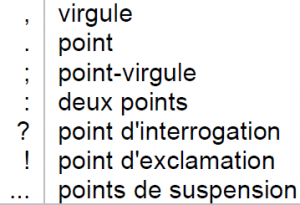Language/French/Grammar/Punctuation
French punctuation is not very different from that of English, Spanish or German.
However, there are some small differences, explained in this article.
One-part punctuation marks
Le point final (the period or full stop)
The period at the end of a sentence marks the right limit, the left limit being marked by the capital letter.
The period is placed directly after the last word. To begin another sentence, you need a space between the period and the capital letter of the next sentence.
- Le chat dort. Il est paisible. J'aimerais être comme lui
The cat is sleeping. It's peaceful. I would like to be like him.
La virgule (the comma)
The comma separates words or groups of words. The comma is placed directly after the word and is followed by a space between it and the next word.
- La Belgique, le Luxembourg, l'Allemagne, la Suisse, l'Italie et l'Espagne sont des pays voisins de la France.
Belgium, Luxembourg, Germany, Switzerland, Italy, and Spain are the countries neighboring France.
You can place a comma after a group of words placed at the beginning of the sentence.
- Cette semaine, nous avons trois réunions.
This week we have three meetings.
But we cannot put a comma between the verb and its subject...
- "Magalie viendra ce soir." not "Magalie, viendra ce soir."
Magalie will come tonight.
Unless there is additional information between them.
- Magalie, que tu connais, viendra ce soir.
Magalie, you know her, is coming tonight.
Two-part punctuation marks
La point virgule (the semicolon)
The semicolon can complete a sentence, but it never ends a text. When a sentence is in close connection with the one before it, it is separated by a semicolon and not by a point. There is no capital letter starting the word that follows the semicolon, unless it is a name. It is separated from the preceding word by a space and followed by a space between it and the next word.
- Il s'était caché ; il pouvait ainsi les observer très attentivement.
He was hidden; he could observe them very carefully.
Les deux-points (the colon)
The colon is common in French. It may introduce direct speech, a citation, or the explanation, conclusion, summary, etc. of whatever precedes it.
The colon is used to announce a quote with quotation marks. It is separated from the preceding word by a space and must also be followed by a space.
- Les pays voisins de la France sont : la Belgique, le Luxembourg, l'Allemagne, la Suisse, l'Italie et l'Espagne.
The neighboring countries of France are: Belgium, Luxembourg, Germany, Switzerland, Italy, and Spain.
- L'auteur affirme : « L'art n'est que rêve ».
The author says: "Art is only a dream."
The colon is also used to mark a logical link between the two proposals (cause, consequence...).
- Il ne sera pas là : il n'a pas été prévenu.
He will not be there: he was not warned.
Le point d'exclamation (the exclamation mark)
The exclamation mark is placed: - At the end of an exclamatory sentence
- Comme il est grand !
How tall he is!
- After interjections. When following an interjection, it is often also added at the end of sentence.
- Zut ! j'ai oublié la réunion !
Heck! I forgot the meeting!
It is separated from the preceding word by a space and followed by a space.
Should there be a capital letter after an exclamation point? It all depends on the following sentence.
- If it is a continuation of the previous sentence, there is no capital letter:
- Tiens ! puisque tu es là, aide-moi !
Look! since you're here, help me!
- If the sentence is a new sentence, it requires a capital letter:
- Comme tu es belle ! Je me souviens qu'à ton âge, j'étais comme toi.
How beautiful you are ! I remember I was like you at your age.
Le point d'interrogation (the question mark)
The question mark ends any direct questioning. It is separated from the preceding word by a space and followed by a space.
- Qui était présent la dernière fois ?
Who was there last time?
However, indirect questions never end with a question mark.
- Je ne sais pas qui était présent la dernière fois.
I do not know who was there last time.
Les points de suspension (the ellipsis)
In French, an interruption or trailing off of speech can be indicated with an ellipsis.
They are not separated from the preceding word by a space but are followed by a space between them and the next word.
- Je ne vous raconte pas la fin...
I cannot tell you the end...
VIDEOS
Don't hesitate to edit this page if you think you can improve it. This wiki is made for you!
What differences have you found between French punctuation and that of your native language?
Please post a comment below... :)


